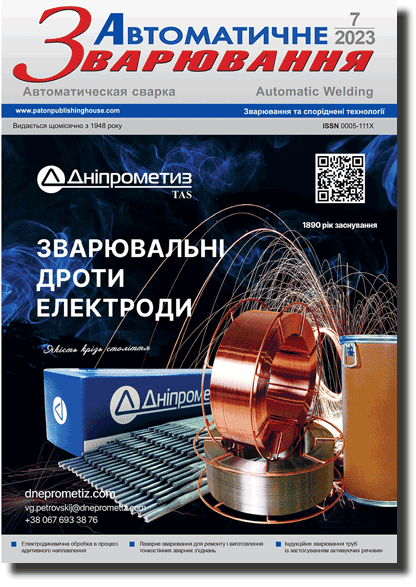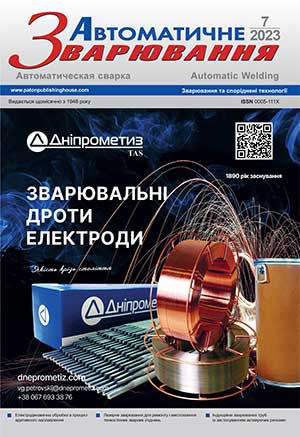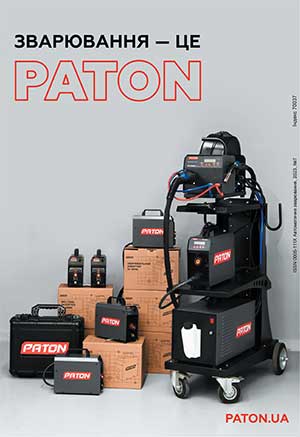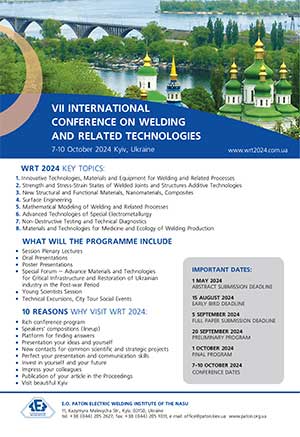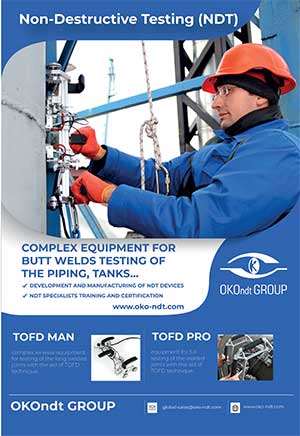| 2023 №07 (03) |
DOI of Article 10.37434/as2023.07.04 |
2023 №07 (05) |
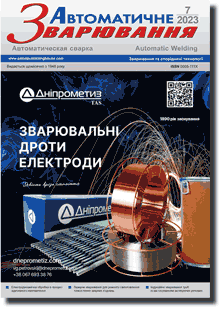
"Avtomatychne Zvaryuvannya" (Automatic Welding), #7, 2023, pp. 31-36
Influence of electron beam focusing current on geometry and microstructure of welded joints of aluminium 2219 alloy
M.O. Rusynyk1, V.M. Nesterenkov1, M. Sahul2, I.M. Klochkov1
1E.O. Paton Electric Welding Institute of the NAS of Ukraine. 11 Kazymyr Malevych Str., 03150, Kyiv, Ukraine. E-mail: office@paton.kiev.ua2Czech Technical University in Prague, Faculty of Mechanical Engineering, Technická 4, 160 00 Prague 6, Czech Republic
The impact of the focusing current of electron beam welding on the nature of the formation of welded joints of aluminium 2219 alloy was investigated. It was established that when the focusing current increases, the width of the facial weld grows. And the width of the weld root depends on the real position of the electron beam focus relative to a sharp focus on the metal surface (639 mA). Dependence of the focusing current on the distribution of copper and aluminium in the weld metal was revealed. An increase in the focusing current from 629 to 649 mA led to an increase in the copper content in the interdendritic regions. Energy dispersion X-ray analysis showed that the microstructure of the welded joint produced at the focusing current of 629 mA, consists of equiaxial dendrites with embedded small particles, pores and α+θ-Al2Cu eutectic, separated in the interdendritic regions. 9 Ref., 4 Tabl., 8 Fig.
Keywords: electron beam welding, assembly and welding equipment, aluminium alloy, energy dispersive X-ray spectroscopy, segregation
Received: 25.05.2023
References
1. Vinogradova, N.M., Starostina, Z.I., Ivanova, T.V. (1975) Aluminium weldable alloys 1201 and 01381 for operation at low temperatures. Aluminium alloys, 7, 65-71 [in Russian].2. Heinz, A., Haszler, A., Keidel, C. et al. (2000) Recent development in aluminum alloys for aerospace application. Mater. Sci. Eng, 280, 102-107. https://doi.org/10.1016/S0921-5093(99)00674-7
3. Skalskyi, V.P., Andreikiv, O.Ie. (2006) Evaluation of bulk damage of materials by acoustic emission method. Lviv, Vydavn. Tsentr Nats. Un-tu [in Ukrainian].
4. Ternovoj, E.G., Bondarev, A.A. (2012) Electron beam welding of aluminium AMg6 and M40 alloys. The Paton Welding J., 4, 8-14.
5. Bondarev, A.A. (1984) State-of-the-art and advantages of electron beam welding process of aluminium alloy structures. In: Proc. of Soviet-American Seminar on Welding of Aluminium Alloys of Cryogenic and General Purpose. Kyiv, 10-19.
6. Yang, Z., He, J. (2021) Numerical investigation on fluid transport phenomena in electron beam welding of aluminum alloy: Effect of the focus position and incident beam angle on the molten pool behavior. Int. J. Therm. Sci. 164, 106914. https://doi.org/10.1016/j.ijthermalsci.2021.106914
7. Quan, Li, Ai-ping, Wu, Yan-jun,Li, et al. (2017) Segregation in fusion weld of 2219 aluminum alloy and its influence on mechanical properties of weld. Transactions of Nonferrous Metals Society of China, 27 (2), 258-271. https://doi.org/10.1016/S1003-6326(17)60030-X
8. Ruwei, Geng, Jun, Du, Zhengying, Wei et al. (2020) Multiscale modelling of microstructure, micro-segregation, and local mechanical properties of Al-Cu alloys in wire and arc additive manufacturing. Additive Manufacturing, 36, 101735. https://doi.org/10.1016/j.addma.2020.101735
9. Poklyatskyi, A.G., Motrunich, S.I., Klochkov, I.M., Labur, T.M. (2021) Some advantages of welded joints of aluminium 1201 alloy produced by friction stir welding. The Paton Welding J., 9, 15-19. https://doi.org/10.37434/tpwj2021.09.03
Advertising in this issue:
The cost of subscription/purchase order journals or individual articles
| Journal/Currency | Annual Set | 1 issue printed |
1 issue |
one article |
| TPWJ/USD | 384 $ | 32 $ | 26 $ | 13 $ |
| TPWJ/EUR | 348 € | 29 € | 24 € | 12 € |
| TPWJ/UAH | 7200 UAH | 600 UAH | 600 UAH | 280 UAH |
| AS/UAH | 1800 UAH | 300 UAH | 300 UAH | 150 UAH |
| AS/USD | 192 $ | 32 $ | 26 $ | 13 $ |
| AS/EUR | 180 € | 30 € | 25 € | 12 € |
| SEM/UAH | 1200 UAH | 300 UAH | 300 UAH | 150 UAH |
| SEM/USD | 128 $ | 32 $ | 26 $ | 13 $ |
| SEM/EUR | 120 € | 30 € | 25 € | 12 € |
| TDNK/UAH | 1200 UAH | 300 UAH | 300 UAH | 150 UAH |
| TDNK/USD | 128 $ | 32 $ | 26 $ | 13 $ |
| TDNK/EUR | 120 € | 30 € | 25 € | 15 € |
AS = «Automatic Welding» - 6 issues per year;
TPWJ = «PATON WELDING JOURNAL» - 12 issues per year;
SEM = «Electrometallurgy Today» - 4 issues per year;
TDNK = «Technical Diagnostics and Non-Destructive Testing» - 4 issues per year.





